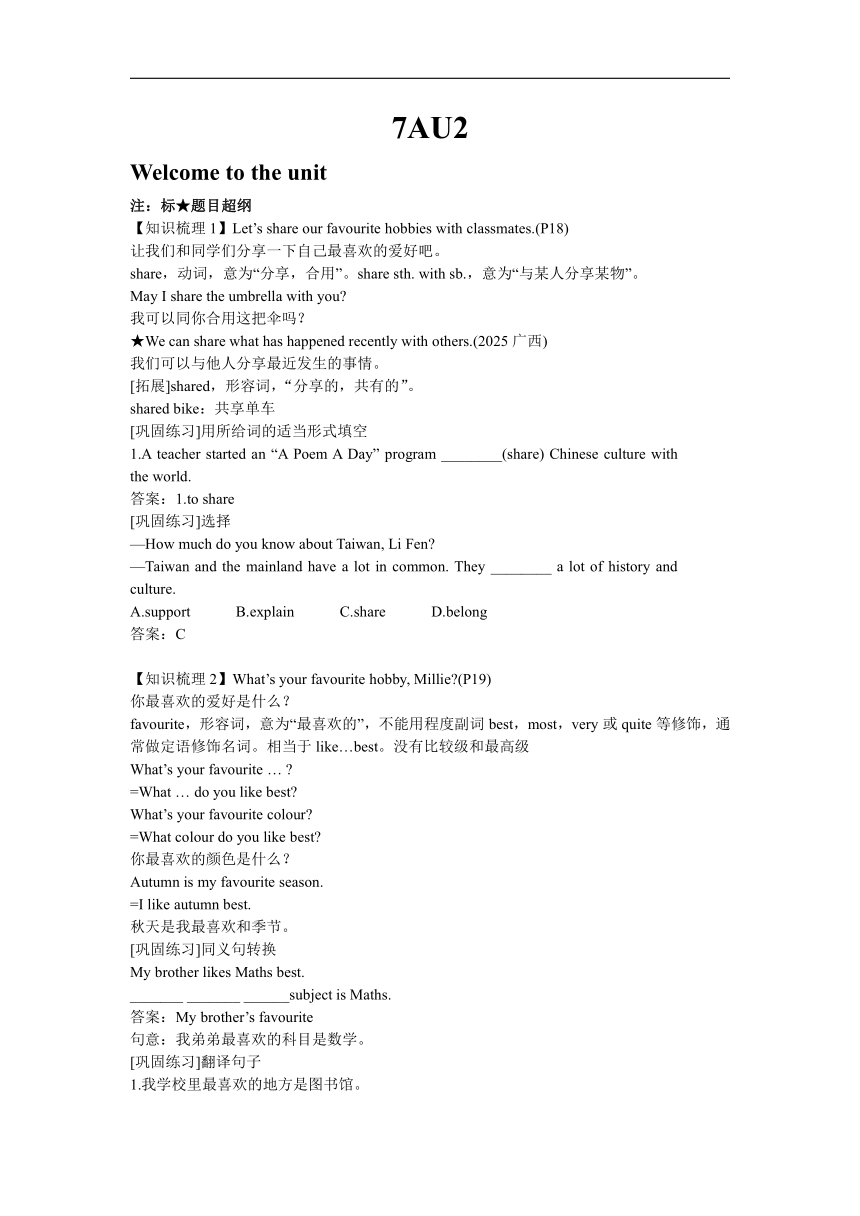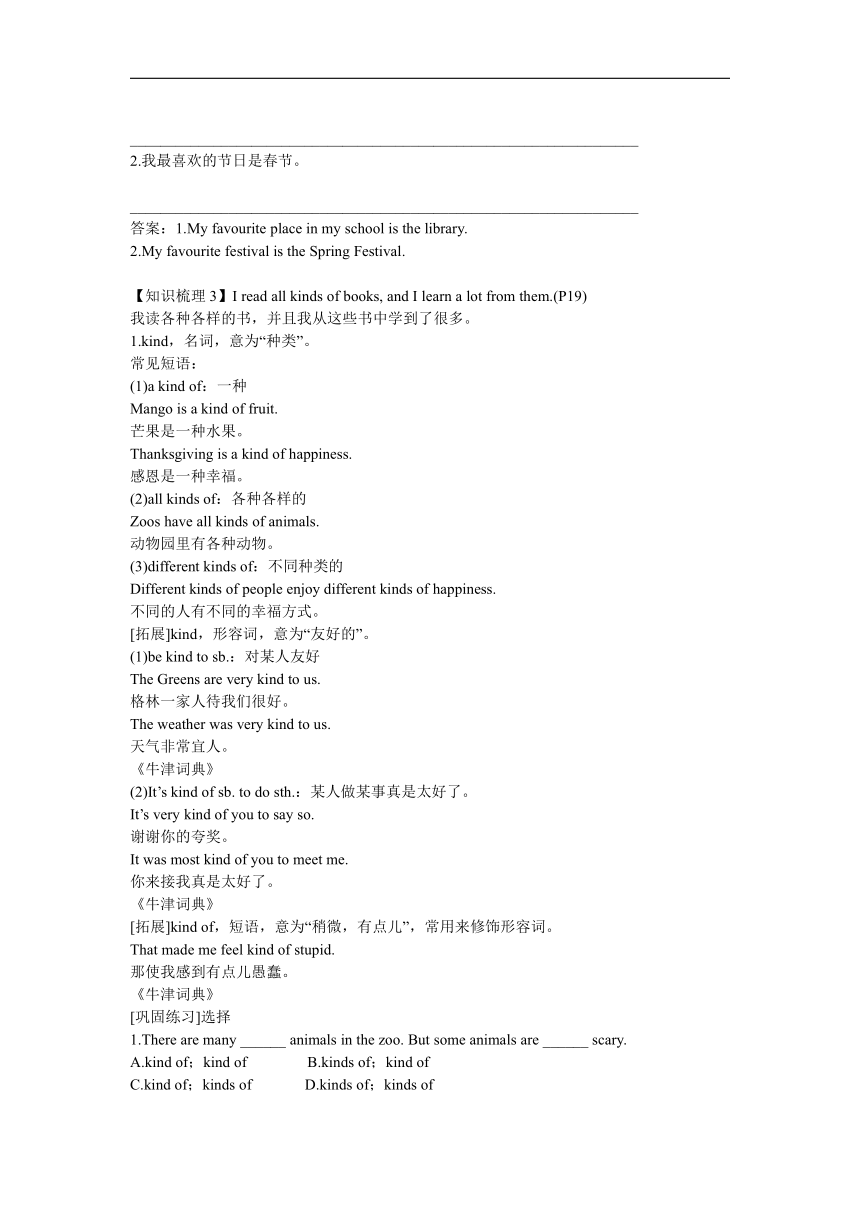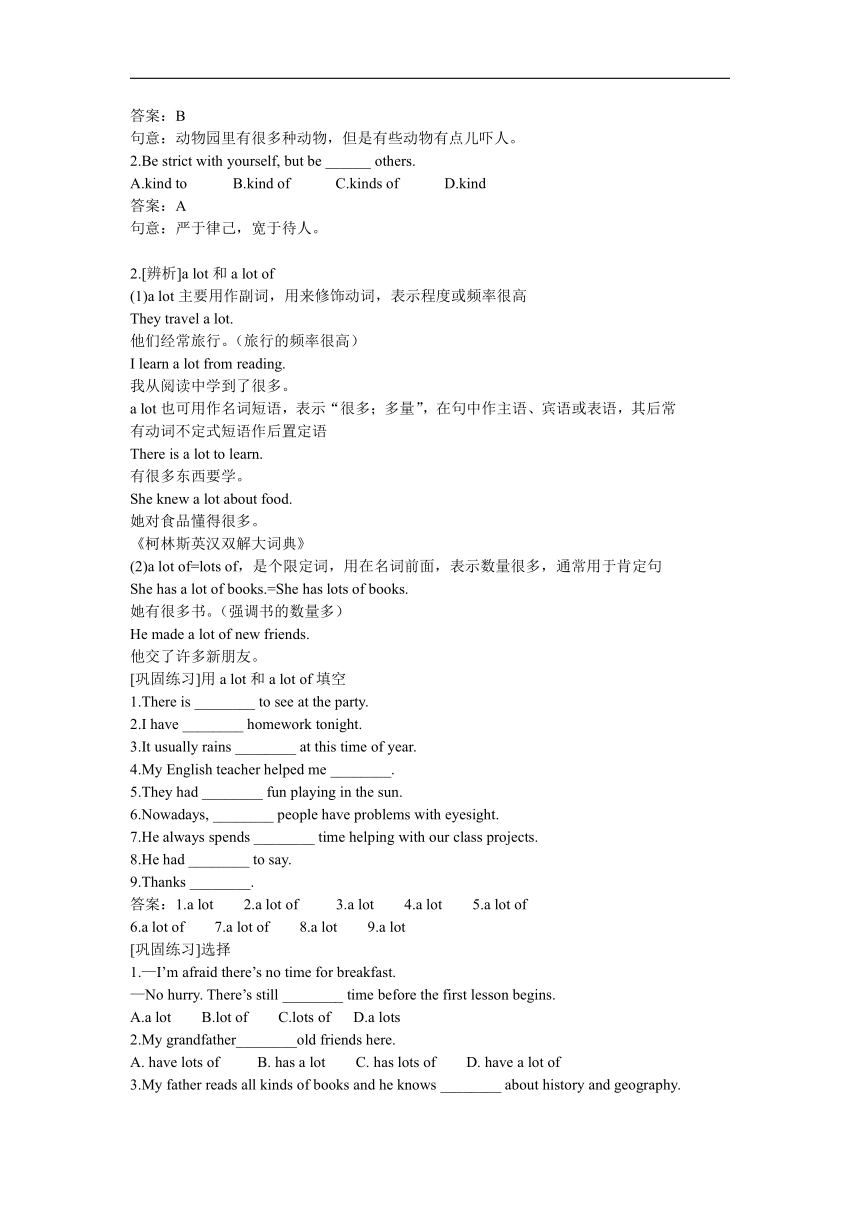Unit2 Hobbies Welcome 知识点整理及练习(含答案)译林版(2024) 七年级英语上册
文档属性
| 名称 | Unit2 Hobbies Welcome 知识点整理及练习(含答案)译林版(2024) 七年级英语上册 |  | |
| 格式 | docx | ||
| 文件大小 | 32.5KB | ||
| 资源类型 | 教案 | ||
| 版本资源 | 译林版 | ||
| 科目 | 英语 | ||
| 更新时间 | 2025-07-17 17:11:05 | ||
图片预览



文档简介
7AU2
Welcome to the unit
注:标★题目超纲
【知识梳理1】Let’s share our favourite hobbies with classmates.(P18)
让我们和同学们分享一下自己最喜欢的爱好吧。
share,动词,意为“分享,合用”。share sth. with sb.,意为“与某人分享某物”。
May I share the umbrella with you
我可以同你合用这把伞吗?
★We can share what has happened recently with others.(2025广西)
我们可以与他人分享最近发生的事情。
[拓展]shared,形容词,“分享的,共有的”。
shared bike:共享单车
[巩固练习]用所给词的适当形式填空
1.A teacher started an “A Poem A Day” program ________(share) Chinese culture with the world.
答案:1.to share
[巩固练习]选择
—How much do you know about Taiwan, Li Fen
—Taiwan and the mainland have a lot in common. They ________ a lot of history and culture.
A.support B.explain C.share D.belong
答案:C
【知识梳理2】What’s your favourite hobby, Millie (P19)
你最喜欢的爱好是什么?
favourite,形容词,意为“最喜欢的”,不能用程度副词best,most,very或quite等修饰,通常做定语修饰名词。相当于like…best。没有比较级和最高级
What’s your favourite …
=What … do you like best
What’s your favourite colour
=What colour do you like best
你最喜欢的颜色是什么?
Autumn is my favourite season.
=I like autumn best.
秋天是我最喜欢和季节。
[巩固练习]同义句转换
My brother likes Maths best.
_______ _______ ______subject is Maths.
答案:My brother’s favourite
句意:我弟弟最喜欢的科目是数学。
[巩固练习]翻译句子
1.我学校里最喜欢的地方是图书馆。
___________________________________________________________________
2.我最喜欢的节日是春节。
___________________________________________________________________
答案:1.My favourite place in my school is the library.
2.My favourite festival is the Spring Festival.
【知识梳理3】I read all kinds of books, and I learn a lot from them.(P19)
我读各种各样的书,并且我从这些书中学到了很多。
1.kind,名词,意为“种类”。
常见短语:
(1)a kind of:一种
Mango is a kind of fruit.
芒果是一种水果。
Thanksgiving is a kind of happiness.
感恩是一种幸福。
(2)all kinds of:各种各样的
Zoos have all kinds of animals.
动物园里有各种动物。
(3)different kinds of:不同种类的
Different kinds of people enjoy different kinds of happiness.
不同的人有不同的幸福方式。
[拓展]kind,形容词,意为“友好的”。
(1)be kind to sb.:对某人友好
The Greens are very kind to us.
格林一家人待我们很好。
The weather was very kind to us.
天气非常宜人。
《牛津词典》
(2)It’s kind of sb. to do sth.:某人做某事真是太好了。
It’s very kind of you to say so.
谢谢你的夸奖。
It was most kind of you to meet me.
你来接我真是太好了。
《牛津词典》
[拓展]kind of,短语,意为“稍微,有点儿”,常用来修饰形容词。
That made me feel kind of stupid.
那使我感到有点儿愚蠢。
《牛津词典》
[巩固练习]选择
1.There are many ______ animals in the zoo. But some animals are ______ scary.
A.kind of;kind of B.kinds of;kind of
C.kind of;kinds of D.kinds of;kinds of
答案:B
句意:动物园里有很多种动物,但是有些动物有点儿吓人。
2.Be strict with yourself, but be ______ others.
A.kind to B.kind of C.kinds of D.kind
答案:A
句意:严于律己,宽于待人。
2.[辨析]a lot和a lot of
(1)a lot主要用作副词,用来修饰动词,表示程度或频率很高
They travel a lot.
他们经常旅行。(旅行的频率很高)
I learn a lot from reading.
我从阅读中学到了很多。
a lot也可用作名词短语,表示“很多;多量”,在句中作主语、宾语或表语,其后常有动词不定式短语作后置定语
There is a lot to learn.
有很多东西要学。
She knew a lot about food.
她对食品懂得很多。
《柯林斯英汉双解大词典》
(2)a lot of=lots of,是个限定词,用在名词前面,表示数量很多,通常用于肯定句
She has a lot of books.=She has lots of books.
她有很多书。(强调书的数量多)
He made a lot of new friends.
他交了许多新朋友。
[巩固练习]用a lot和a lot of填空
1.There is ________ to see at the party.
2.I have ________ homework tonight.
3.It usually rains ________ at this time of year.
4.My English teacher helped me ________.
5.They had ________ fun playing in the sun.
6.Nowadays, ________ people have problems with eyesight.
7.He always spends ________ time helping with our class projects.
8.He had ________ to say.
9.Thanks ________.
答案:1.a lot 2.a lot of 3.a lot 4.a lot 5.a lot of
6.a lot of 7.a lot of 8.a lot 9.a lot
[巩固练习]选择
1.—I’m afraid there’s no time for breakfast.
—No hurry. There’s still ________ time before the first lesson begins.
A.a lot B.lot of C.lots of D.a lots
2.My grandfather________old friends here.
A. have lots of B. has a lot C. has lots of D. have a lot of
3.My father reads all kinds of books and he knows ________ about history and geography.
A.a lot of B.so much C.so many D.lots of
4.—Will you go to Shanghai for your winter holiday
—Maybe. I should ________ it ________ my parents.
A.talk about;with B.learn about;from
C.write about;of D.worry about;to
答案:CCBA
【知识梳理3】What about you (P19)
你呢?
常见的表示建议的句型有4种:
1.What/How about …
这个句型中about是介词,后面加名词短语,动词的-ing形式,代词宾格。
What about this book
这本书怎么样?
What about going boating
去划船怎样?
2.Why don’t you do…… =Why not do……
Why don't you get yourself a car
你为什么不买辆汽车呢?
《牛津词典》
3.Shall we do……
Shall we have breakfast
我们吃早餐吧?
4.Let sb. do…….
Let us play basketball.
让我们打篮球吧。
[巩固练习]用所给词的正确形式填空
1.What about ________(win) the game for me
答案:winning
句意:为我,赢得这个比赛怎么样?
[巩固练习]填空
1.When shall I _________(到达)the top and hold all mountains in a single glance
答案:reach
句意:什么时候我才能到山顶呢,然后一览众山小呢?
[巩固练习]选择
1.—It’s a fine day today. What about _________
—Sounds great!
A.go hiking B.go to hike C.going hiking D.to go to hike
答案:C
句意:—今天天真好,去远足怎么样?
—听起来不错。
2.—When shall we meet
—______a quarter past ten
—______meet a little earlier Let’s make it half past nine.
A. What about; Why don’t B. Why not; How about
C. How about; Why not D. Why don’t; What about
答案:C
句意:—我们什么时候见?
—10点一刻怎么样?
—早点怎么样?九点半?
3.Why not ________your teacher for help when you can’t finish _______it by yourself
A.ask;writing B.to ask;writing C.ask;write D. asking;write
答案:A
句意:当你不能独立完成作业时,为什么不向老师求助呢?
4.It’s too cold in the room. Let’s _____to keep warm.
A.make fire B.make a fire C.making fire D. making a fire
答案:B
句意:房间里太冷了,生个火取暖吧。
5.—________to school
—Because he is too young. He is only three years old.
A. Let him go B. Why go C. Why not go D. Why doesn’t he go
答案:D
句意:—他为什么不上学呢?
—因为他太小了,他只有3岁。
6.—Look! Kangkang, that old man is crossing the crosswalk.
—Jane, let’s________ him.
A. helps B. to help C. helping D. help
答案:A
句意:—康康快看! 那个老人正在过马路。
—简,让我们去帮他。
7.—Let’s do something at the party. What about _______
—No. I’d like _______.
A.to sing; to dance B. to sing; dancing
C. singing; dancing D. singing; to dance
答案:D
句意:—让我们在聚会上做点什么吧。唱歌怎么样?
—不,我想跳舞。
8.What about ________ the song Together for a Shared Future Its name is the slogan(口号) of Beijing 2022 Olympic Winter Games.
A.sing B.singing C.to sing D.sang
答案:B
句意:唱《携手共进》这首歌怎么样?它的是北京2022年冬季奥运会的口号。
9.—________ going to the library this afternoon
—You read my mind. Reading is my favourite.
A.Why don’t you B.Why not C.How D.What about
答案:D
句意:—今天下午去图书馆?
—你真了解我啊。读书是我的最爱。
10.[2024天津改编]Let’s ________ to the Tianjin TV and Radio Tower ________ the beautiful sights.
A.go;to enjoy B.to go;to enjoy C.go;enjoy D.to go;enjoy
答案:A
句意:让我们去天津广播电视塔欣赏美丽的景色吧。
【知识梳理4】How often do you go swimming (P19)
你多久去游泳一次?
1.how often意为“多久一次”,用来询问动作发生的频率,常用表示频率的词或短语作答。
—How often do you go to the theatre 你多长时间看一次戏?
—Once a week.每周一次。
[拓展]与how相关的其他短语:
(1)how soon:多久,询问某件事情需要多久完成。
—How soon will Ann finish her homework 安需要多久才能完成她的作业?
—In an hour.一小时以后
(2)how long:多长,询问长度或持续时间
—How long is the river 这条河多长?
—About 500 km.大约500千米。
—How long did he stay here 他在这儿待了多久?
—About two weeks.大约两个星期。
(3)how far:多远,询问距离
—How far is it from your home to the park 从你家到公园有多远?
—It’s two kilometers.两公里远。
—It’s 5 minutes’ walk.步行要5分钟。
[巩固练习]选择
(1)—____do you go shopping
—Twice a week.
A. How soon B. When C. How often D. How long
答案:C
句意:—你多长时间购物一次?
—每两周一次
(2)—______ is it from Suqian to Jiuzhai Valley
—About 1,200 kilometers away. But I’m not sure.
A.How often B.How soon C.How long D.How far
答案:D
句意:—从宿迁到九寨沟多远?
—大约一千二百公里远。但是我不能确定。
(3)—______ do you help at the old people’s home
—Once a week. We should care about the old more.
A.How long B.How often C.How soon D.How far
答案:B
句意:—你多久到养老院帮忙一次?
—每周一次。我们应该多关心老人。
(4)—______did you stay here during the Lantern Festival
—For six days.
A. How long B. How often C. How soon D.How far
答案:A
句意:—元宵节期间你在这呆了多久?
—六天。
(5)—________ do you drink milk, Cindy
—Every day.
A. How often B. How soon C. How much D. How long
答案:A
句意:—辛迪,你多久喝一次牛奶?
—每天。
(6)—______have you been a member of the Helpers’ Club
—For two years.
A. How soon B. How long C. How often D.How far
答案:B
句意:—你加入互助会有多久了?
—二年了。
(7)—________is it from your home to school
—About ten minutes’ walk.
A.How long B.How far C.How often D.How soon
(8)—________ do you have English lessons in a week
—Twice a week.
A.How many B.How long C.How often D.How soon
答案:7-10BC
2.go+动词-ing形式表示进行某项活动,特别指户外活动。动词-ing前面不能用some或其他表数量概念的词修饰。常见的此类短语有:
go swimming:去游泳
go hiking:去远足
go climbing:去爬山
go camping:去野营
go walking:去散步
go running:去跑步
go hunting:去打猎
go shopping:去购物
go fishing:去钓鱼
go boating:去划船
go skiing:去滑雪
[巩固练习]翻译句子
(1)让我们一起去游泳吧!
(2)我今天下午得去商店买东西。
答案:(1)Let's go swimming together!
(2)I have to go shopping this afternoon.
Welcome to the unit
注:标★题目超纲
【知识梳理1】Let’s share our favourite hobbies with classmates.(P18)
让我们和同学们分享一下自己最喜欢的爱好吧。
share,动词,意为“分享,合用”。share sth. with sb.,意为“与某人分享某物”。
May I share the umbrella with you
我可以同你合用这把伞吗?
★We can share what has happened recently with others.(2025广西)
我们可以与他人分享最近发生的事情。
[拓展]shared,形容词,“分享的,共有的”。
shared bike:共享单车
[巩固练习]用所给词的适当形式填空
1.A teacher started an “A Poem A Day” program ________(share) Chinese culture with the world.
答案:1.to share
[巩固练习]选择
—How much do you know about Taiwan, Li Fen
—Taiwan and the mainland have a lot in common. They ________ a lot of history and culture.
A.support B.explain C.share D.belong
答案:C
【知识梳理2】What’s your favourite hobby, Millie (P19)
你最喜欢的爱好是什么?
favourite,形容词,意为“最喜欢的”,不能用程度副词best,most,very或quite等修饰,通常做定语修饰名词。相当于like…best。没有比较级和最高级
What’s your favourite …
=What … do you like best
What’s your favourite colour
=What colour do you like best
你最喜欢的颜色是什么?
Autumn is my favourite season.
=I like autumn best.
秋天是我最喜欢和季节。
[巩固练习]同义句转换
My brother likes Maths best.
_______ _______ ______subject is Maths.
答案:My brother’s favourite
句意:我弟弟最喜欢的科目是数学。
[巩固练习]翻译句子
1.我学校里最喜欢的地方是图书馆。
___________________________________________________________________
2.我最喜欢的节日是春节。
___________________________________________________________________
答案:1.My favourite place in my school is the library.
2.My favourite festival is the Spring Festival.
【知识梳理3】I read all kinds of books, and I learn a lot from them.(P19)
我读各种各样的书,并且我从这些书中学到了很多。
1.kind,名词,意为“种类”。
常见短语:
(1)a kind of:一种
Mango is a kind of fruit.
芒果是一种水果。
Thanksgiving is a kind of happiness.
感恩是一种幸福。
(2)all kinds of:各种各样的
Zoos have all kinds of animals.
动物园里有各种动物。
(3)different kinds of:不同种类的
Different kinds of people enjoy different kinds of happiness.
不同的人有不同的幸福方式。
[拓展]kind,形容词,意为“友好的”。
(1)be kind to sb.:对某人友好
The Greens are very kind to us.
格林一家人待我们很好。
The weather was very kind to us.
天气非常宜人。
《牛津词典》
(2)It’s kind of sb. to do sth.:某人做某事真是太好了。
It’s very kind of you to say so.
谢谢你的夸奖。
It was most kind of you to meet me.
你来接我真是太好了。
《牛津词典》
[拓展]kind of,短语,意为“稍微,有点儿”,常用来修饰形容词。
That made me feel kind of stupid.
那使我感到有点儿愚蠢。
《牛津词典》
[巩固练习]选择
1.There are many ______ animals in the zoo. But some animals are ______ scary.
A.kind of;kind of B.kinds of;kind of
C.kind of;kinds of D.kinds of;kinds of
答案:B
句意:动物园里有很多种动物,但是有些动物有点儿吓人。
2.Be strict with yourself, but be ______ others.
A.kind to B.kind of C.kinds of D.kind
答案:A
句意:严于律己,宽于待人。
2.[辨析]a lot和a lot of
(1)a lot主要用作副词,用来修饰动词,表示程度或频率很高
They travel a lot.
他们经常旅行。(旅行的频率很高)
I learn a lot from reading.
我从阅读中学到了很多。
a lot也可用作名词短语,表示“很多;多量”,在句中作主语、宾语或表语,其后常有动词不定式短语作后置定语
There is a lot to learn.
有很多东西要学。
She knew a lot about food.
她对食品懂得很多。
《柯林斯英汉双解大词典》
(2)a lot of=lots of,是个限定词,用在名词前面,表示数量很多,通常用于肯定句
She has a lot of books.=She has lots of books.
她有很多书。(强调书的数量多)
He made a lot of new friends.
他交了许多新朋友。
[巩固练习]用a lot和a lot of填空
1.There is ________ to see at the party.
2.I have ________ homework tonight.
3.It usually rains ________ at this time of year.
4.My English teacher helped me ________.
5.They had ________ fun playing in the sun.
6.Nowadays, ________ people have problems with eyesight.
7.He always spends ________ time helping with our class projects.
8.He had ________ to say.
9.Thanks ________.
答案:1.a lot 2.a lot of 3.a lot 4.a lot 5.a lot of
6.a lot of 7.a lot of 8.a lot 9.a lot
[巩固练习]选择
1.—I’m afraid there’s no time for breakfast.
—No hurry. There’s still ________ time before the first lesson begins.
A.a lot B.lot of C.lots of D.a lots
2.My grandfather________old friends here.
A. have lots of B. has a lot C. has lots of D. have a lot of
3.My father reads all kinds of books and he knows ________ about history and geography.
A.a lot of B.so much C.so many D.lots of
4.—Will you go to Shanghai for your winter holiday
—Maybe. I should ________ it ________ my parents.
A.talk about;with B.learn about;from
C.write about;of D.worry about;to
答案:CCBA
【知识梳理3】What about you (P19)
你呢?
常见的表示建议的句型有4种:
1.What/How about …
这个句型中about是介词,后面加名词短语,动词的-ing形式,代词宾格。
What about this book
这本书怎么样?
What about going boating
去划船怎样?
2.Why don’t you do…… =Why not do……
Why don't you get yourself a car
你为什么不买辆汽车呢?
《牛津词典》
3.Shall we do……
Shall we have breakfast
我们吃早餐吧?
4.Let sb. do…….
Let us play basketball.
让我们打篮球吧。
[巩固练习]用所给词的正确形式填空
1.What about ________(win) the game for me
答案:winning
句意:为我,赢得这个比赛怎么样?
[巩固练习]填空
1.When shall I _________(到达)the top and hold all mountains in a single glance
答案:reach
句意:什么时候我才能到山顶呢,然后一览众山小呢?
[巩固练习]选择
1.—It’s a fine day today. What about _________
—Sounds great!
A.go hiking B.go to hike C.going hiking D.to go to hike
答案:C
句意:—今天天真好,去远足怎么样?
—听起来不错。
2.—When shall we meet
—______a quarter past ten
—______meet a little earlier Let’s make it half past nine.
A. What about; Why don’t B. Why not; How about
C. How about; Why not D. Why don’t; What about
答案:C
句意:—我们什么时候见?
—10点一刻怎么样?
—早点怎么样?九点半?
3.Why not ________your teacher for help when you can’t finish _______it by yourself
A.ask;writing B.to ask;writing C.ask;write D. asking;write
答案:A
句意:当你不能独立完成作业时,为什么不向老师求助呢?
4.It’s too cold in the room. Let’s _____to keep warm.
A.make fire B.make a fire C.making fire D. making a fire
答案:B
句意:房间里太冷了,生个火取暖吧。
5.—________to school
—Because he is too young. He is only three years old.
A. Let him go B. Why go C. Why not go D. Why doesn’t he go
答案:D
句意:—他为什么不上学呢?
—因为他太小了,他只有3岁。
6.—Look! Kangkang, that old man is crossing the crosswalk.
—Jane, let’s________ him.
A. helps B. to help C. helping D. help
答案:A
句意:—康康快看! 那个老人正在过马路。
—简,让我们去帮他。
7.—Let’s do something at the party. What about _______
—No. I’d like _______.
A.to sing; to dance B. to sing; dancing
C. singing; dancing D. singing; to dance
答案:D
句意:—让我们在聚会上做点什么吧。唱歌怎么样?
—不,我想跳舞。
8.What about ________ the song Together for a Shared Future Its name is the slogan(口号) of Beijing 2022 Olympic Winter Games.
A.sing B.singing C.to sing D.sang
答案:B
句意:唱《携手共进》这首歌怎么样?它的是北京2022年冬季奥运会的口号。
9.—________ going to the library this afternoon
—You read my mind. Reading is my favourite.
A.Why don’t you B.Why not C.How D.What about
答案:D
句意:—今天下午去图书馆?
—你真了解我啊。读书是我的最爱。
10.[2024天津改编]Let’s ________ to the Tianjin TV and Radio Tower ________ the beautiful sights.
A.go;to enjoy B.to go;to enjoy C.go;enjoy D.to go;enjoy
答案:A
句意:让我们去天津广播电视塔欣赏美丽的景色吧。
【知识梳理4】How often do you go swimming (P19)
你多久去游泳一次?
1.how often意为“多久一次”,用来询问动作发生的频率,常用表示频率的词或短语作答。
—How often do you go to the theatre 你多长时间看一次戏?
—Once a week.每周一次。
[拓展]与how相关的其他短语:
(1)how soon:多久,询问某件事情需要多久完成。
—How soon will Ann finish her homework 安需要多久才能完成她的作业?
—In an hour.一小时以后
(2)how long:多长,询问长度或持续时间
—How long is the river 这条河多长?
—About 500 km.大约500千米。
—How long did he stay here 他在这儿待了多久?
—About two weeks.大约两个星期。
(3)how far:多远,询问距离
—How far is it from your home to the park 从你家到公园有多远?
—It’s two kilometers.两公里远。
—It’s 5 minutes’ walk.步行要5分钟。
[巩固练习]选择
(1)—____do you go shopping
—Twice a week.
A. How soon B. When C. How often D. How long
答案:C
句意:—你多长时间购物一次?
—每两周一次
(2)—______ is it from Suqian to Jiuzhai Valley
—About 1,200 kilometers away. But I’m not sure.
A.How often B.How soon C.How long D.How far
答案:D
句意:—从宿迁到九寨沟多远?
—大约一千二百公里远。但是我不能确定。
(3)—______ do you help at the old people’s home
—Once a week. We should care about the old more.
A.How long B.How often C.How soon D.How far
答案:B
句意:—你多久到养老院帮忙一次?
—每周一次。我们应该多关心老人。
(4)—______did you stay here during the Lantern Festival
—For six days.
A. How long B. How often C. How soon D.How far
答案:A
句意:—元宵节期间你在这呆了多久?
—六天。
(5)—________ do you drink milk, Cindy
—Every day.
A. How often B. How soon C. How much D. How long
答案:A
句意:—辛迪,你多久喝一次牛奶?
—每天。
(6)—______have you been a member of the Helpers’ Club
—For two years.
A. How soon B. How long C. How often D.How far
答案:B
句意:—你加入互助会有多久了?
—二年了。
(7)—________is it from your home to school
—About ten minutes’ walk.
A.How long B.How far C.How often D.How soon
(8)—________ do you have English lessons in a week
—Twice a week.
A.How many B.How long C.How often D.How soon
答案:7-10BC
2.go+动词-ing形式表示进行某项活动,特别指户外活动。动词-ing前面不能用some或其他表数量概念的词修饰。常见的此类短语有:
go swimming:去游泳
go hiking:去远足
go climbing:去爬山
go camping:去野营
go walking:去散步
go running:去跑步
go hunting:去打猎
go shopping:去购物
go fishing:去钓鱼
go boating:去划船
go skiing:去滑雪
[巩固练习]翻译句子
(1)让我们一起去游泳吧!
(2)我今天下午得去商店买东西。
答案:(1)Let's go swimming together!
(2)I have to go shopping this afternoon.
同课章节目录
